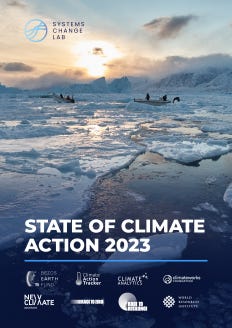Climate Action Report 2023: A Sobering Reality Check on Global Warming
The world falls behind in almost every action required to cut carbon emissions.
The State of Climate Action 2023 is a comprehensive report that assesses the global progress and gaps in climate action across sectors to limit warming to 1.5°C. It provides a roadmap of how to close the gap and avoid dangerous climate impacts.
Sadly, the news is not good. The gap in climate action is huge.
The report assesses 42 indicators of climate action across different sectors and finds that only one of them is on track for 2030. Progress is lagging or even reversing for most indicators, such as public financing for fossil fuels, deforestation, and carbon pricing. Only one indicator, electric passenger car (EVs) sales, is on track for 2030. This means that the world is failing to meet the Paris Agreement’s goal of limiting warming to 1.5°C and avoiding the worst impacts of climate change.
The report emphasises that an enormous acceleration in effort will be required across all sectors to get on track for 2030 and quantifies how much more effort is needed to close the gap in climate action by 2030.
For example, the world needs to dramatically increase the growth of solar and wind power. A bright spot that underscores the possibility of rapid change is that recent efforts to scale up renewable power sources have progressed at a faster pace than those dedicated to phasing out fossil fuel electricity generation. The International Energy Agency (IEA), expects that the global addition of renewable power capacity will jump by a third in 2023, driven by growing policy momentum and a higher price of fossil fuels. Also, emissions in China, currently the world’s largest emitter of carbon dioxide, are expected to fall as early as next year, much sooner than expected, thanks to massive investments in the energy transition. Nevertheless, China’s overall carbon emissions in the third quarter of 2023 rose by 4.7% relative to the same period in 2022. Furthermore, the world’s fossil fuel producers are planning expansions that would blow the planet’s carbon budget twice over. This poses a significant threat to humanity's future, as it would lock in greenhouse gas emissions and exacerbate the climate crisis

The report also suggests that we need to phase out coal in electricity generation (obviously) seven times faster, increase the capacity and coverage of public transportation systems six times faster, and shift to healthier diets eight times faster than current rates. Food production and consumption contribute to about a third of all human-caused greenhouse gas emissions. The largest chunk of food-related greenhouse gases comes from agriculture and land use, including methane from cattle’s digestive process, nitrous oxide from fertilizers used for crop production, and carbon dioxide from cutting down forests to expand farmland. These are just some of the examples of the massive acceleration required across all sectors.
I would like to expand more on the EVs sales. Despite their benefits, EVs can cause significant environmental damage. This is primarily due to the carbon dioxide emissions generated during their production, which are 59% higher than those of traditional internal combustion engine vehicles. As most car batteries are made in China, South Korea, and Japan, where the use of carbon in electricity production is relatively high, the battery manufacturing process is a major contributor to these emissions. Not to mention the significant damage that the mining of lithium, cobalt, and other materials used in batteries causes to the environment. In addition, the mining process itself is very energy-intensive, which further contributes to climate change.
Transport transformation is critical to addressing climate change and moving people out of poverty. We, the citizens, can play a key role in advocating for the expansion of public transportation. We can do this by voting for policies and politicians that prioritise public transportation, participating in public consultations about transit planning, and choosing to use public transportation whenever possible.
The report emphasises that climate action must be guided by principles of justice and equity, ensuring that the benefits and costs of mitigation are shared fairly and that those affected by the transitions have a voice in decision-making.
The State of Climate Action report is funded by the Bezos Earth Fund, the Center for Global Commons, the ClimateWorks Foundation, the Global Commons Alliance, and the Global Environment Facility.
Join the subscriber’s chat if you want to start or join a conversation. Threads are a quieter space where readers can have a real, in-depth talk with me and others about issues that matter. All are welcome, except trolls.




